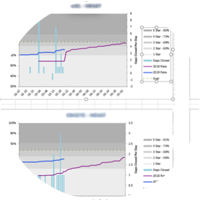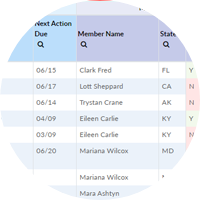Covid-19, 2022 Star Ratings, and Whats Left for 2020
The Covid-19 pandemic has had a sudden and far-reaching impact on Medicare Advantage Star Ratings. CMS will shortly publish 2021 Star Ratings including numerous adjustments for data that was not collected due to the pandemic. CMS has also shared their plans for 2022 Star Ratings - how they will score the quality of care and service occurring in this unprecedented year. In this post, Baltimore Health Analytics shares the key points of the communication and guidance from NCQA® and CMS regarding this year and what levers may still be pulled in the remaining months of 2020 to safeguard your future Star Ratings.
NCQA® March Response to Covid-19
The National Committee for Quality Assurance (NCQA) ®, custodians of the HEDIS®, CAHPS® and HOS® , in conjunction with its stakeholders, made a decision in late March (after hybrid chart review season had begun) to allow plans across all product lines to stop medical record collection if the plan so wished. Plans were instructed to submit administrative measure results (those solely based on claims, encounter and supplemental data) as usual, but had the option to submit prior-year hybrid rates on applicable measures.
March 31, 2020 CMS Interim Final Rule with Comment (IFC)
On March 31, CMS sent out the first Covid-19 IFC related to the Public Health Emergency (PHE). The IFC advice to health plans was that they could stop hybrid chart review and CAHPS collection in 2020 and submit their prior year HEDIS® hybrid rates along with the current years administrative rates. CMS indicated at the time that they believed asking providers to assist with chart collection diverted resources from dealing with the growing pandemic.
NCQA Analysis of HEDIS 2020 Submissions
NCQA® performed an assessment of the impact of Covid-19 on the collection and reporting of HEDIS® measures and posted their findings in August. They found that administrative rates were submitted in comparable volume to prior years, and that benchmarks of those rates were comparable and stable. When it came to CAHPS® submissions, NCQA® found that response rates were down in 2020, with fewer plans being able to report valid rates. Interestingly, the greatest decrease in response rates were seen in Medicaid plans across the country. Based on their analysis, NCQA® made the decision to not make a Medicare 2020 version of its Quality Compass product (a comprehensive, plan by plan breakdown of all HEDIS® and CAHPS® measures for plans across the country) available.
August 24, 2020 CMS Interim Final Rule with Comment
On August 24 sent out its 3rd Covid-19 IFC.* CMS noted they had announced a method for handling public emergencies in 2019, (the so-called 60% rule, where if 60% of enrollees in a health plan were affected by a FEMA-designated area of “extreme and uncontrollable circumstances” the disaster policy would kick in), but acknowledged that the method failed to anticipate a situation as broad as the Covid-19 PHE. Under the 2019 rule, virtually 98% of MAPD plans in the country would qualify for disaster relief and there would be no way to calculate Star Ratings without modification to the policy. In this IFC, CMS puts forth the guidance for how the 2022 Stars will be calculated.
Most significantly for 2022 Stars across these communications:
- Expansion of the “hold harmless provision” for the Improvement Measures to all contracts for 2022. In BHA’s opinion, this should protect plans from poor scores on heavily weighted Improvement measures based on lower numeric scores. However, there may be an opportunity for plans that are able to achieve statistically significant improvement in some measures as it is that the cutpoints for these 5x weighted measures will be lowered.
- Moved HOS survey collection from spring to summer 2020 (found in IFC-1), and announced in IFC-3 that if the data collected is not valid, they will use the previously submitted HOS results. The soon to be published 2021 Stars are based on HOS completed during 2019 and are unaffected.
- Contracts will be able to receive the higher of 2022- or 2021-Star measure-level ratings for all non-CAHPS measures for purposes of calculating the 2022 Star Ratings
- This change has been implemented due to the impact of Covid-19 on data collection in 2020 which does not provide CMS enough data to perform measure cut point calculations for the non-CAHPS® measures.
-
- This also applies for calculating performance summary and variance thresholds for Reward Factor calculations
- Of note, CMS expects that HEDIS®, HOS, ®and CAHPS® collection will return to normal in 2021 Spring and Summer
Our Take
CMS is emphatic that they want MA plans to strive for high quality care and service to their enrollees and not use the pandemic as a reason to ease up in favor of cost containment. CMS still wants and expects plans to focus on Star clinical and service measures. It is already September, and it is recognized that utilization of routine care and screenings has been significantly reduced by the pandemic.
What Next?
It will be essential for plans to work closely with their provider networks to ensure that members continue to receive services for their specific care needs, even if that means looking to telehealth and telephonic care as appropriate when Covid-19 spread concerns are in place. Plans should also look to ensure that they take every advantage of administrative data source – claims, encounters, lab and pharmacy feeds and especially supplemental data sources that can convert in-house medical record data into HEDIS acceptable electronic formats.
BHA has 2 tools to help:
- BHA Ocular for SDS Chart Review – an effective tool to convert existing in-house medical records into supplemental data to close gaps and reduce 2021 chart review; and
- BHA Rover to quickly spin up a clinical campaign without first installing a full blown EMR
For information on these tools, please reach out to Kathy Lester, Director of Quality Improvement Consulting at Baltimore Health Analytics at kathy@baltimorehealthanalytics.com.
* The 2nd Covid-19 IFC did not deal with Star Ratings.


